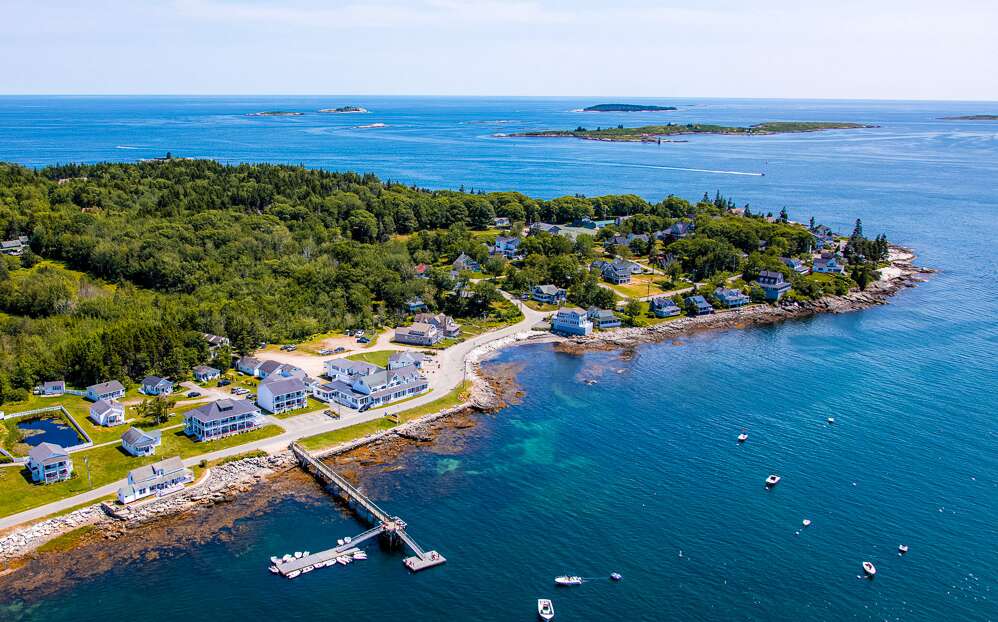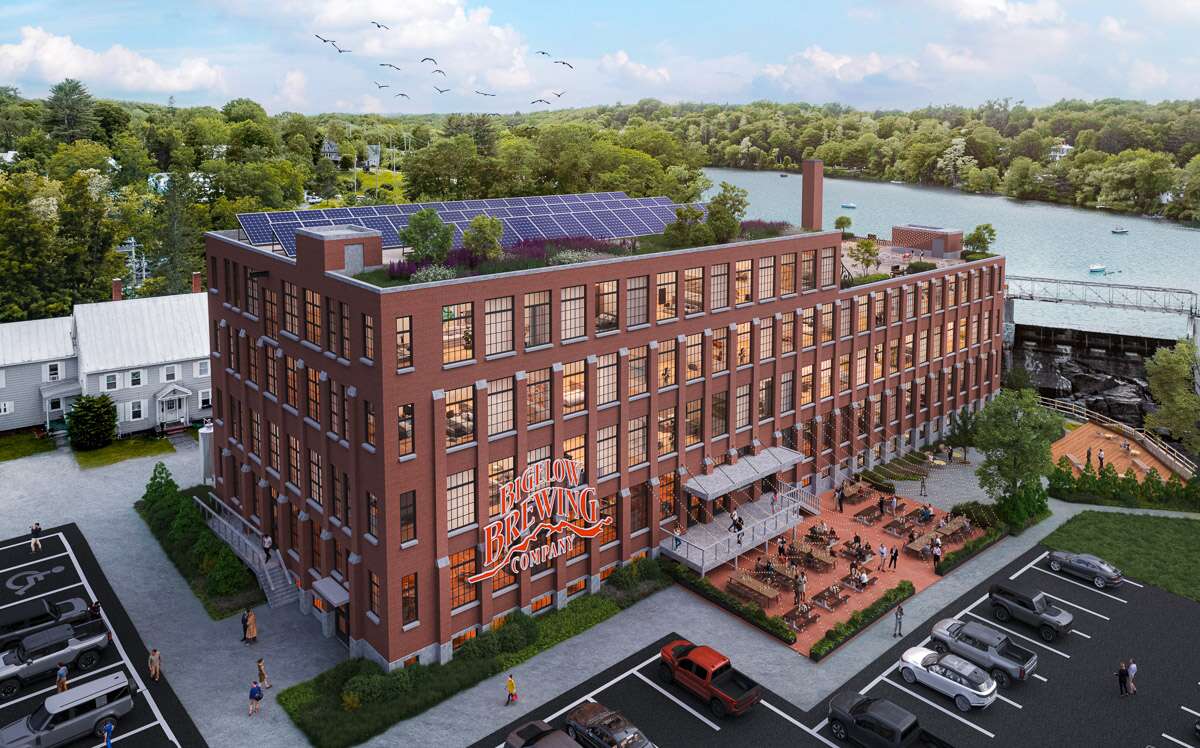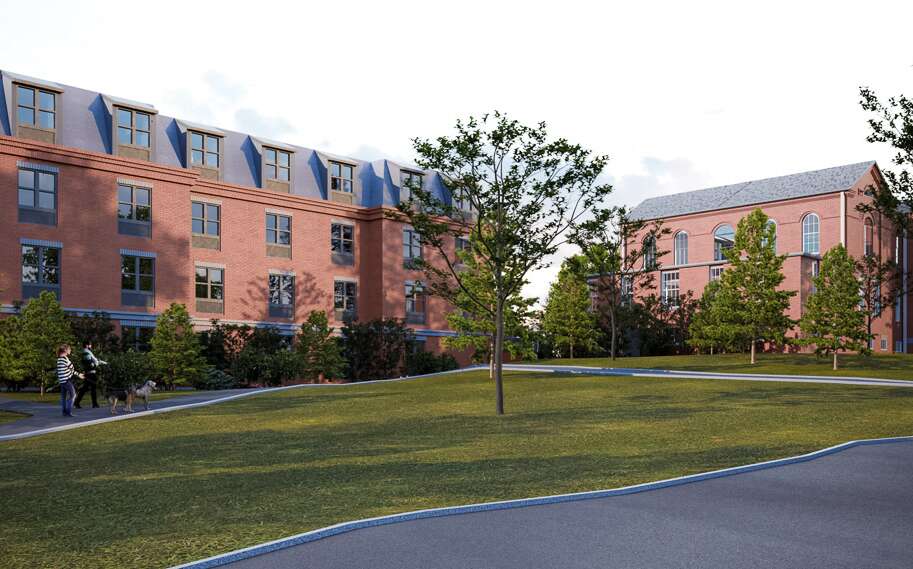
Hotel development remains strong: Newcomers include boutique hotels and inns
 Photo / Courtesy of the Lockwood Hotel
The $26 million Lockwood Hotel in Waterville is part of a major initiative to transform the downtown into a vibrant arts and culture destination.
Photo / Courtesy of the Lockwood Hotel
The $26 million Lockwood Hotel in Waterville is part of a major initiative to transform the downtown into a vibrant arts and culture destination.
Hotel development is booming in sync with tourism trends, which show that visitors continue to flock to Maine and are staying longer than ever.
New construction and renovations are underway from southern Maine to Aroostook County, with focal points on spaces and amenities that meet evolving customer expectations while also contributing to local economies.
Travelers are gravitating to Portland as a destination now more than ever, says Jim Brady, president of Fathom Cos., which has a hotel on the drawing board in Portland.
Maine’s most northern county, Aroostook, is also seeing business travelers and outdoor enthusiasts. That spurred renovations of Presque Isle’s Northeastland Hotel, with updated spaces and a new restaurant and co-working space to attract businesspeople and visitors alike.
In Waterville, the recent addition of the Lockwood Hotel is part of a major initiative to transform the downtown into a arts-and-culture destination.
Bar Harbor’s market opportunity remains strong, says local hotelier Stephen Coston. Neighboring Acadia National Park, which attracts 4 million people annually, the town of 5,500 year-round residents neighbors has numerous inns and small hotels, with room for more.
“We have the right balance in a lot of ways that most places don’t,” Coston says of the area. “I think recently we have been able to show people that there is no ‘bad’ time to visit Bar Harbor, and now the season is much longer than it used to be.”
Wider Northeast audience
In Waterville, the $26 million Lockwood, with 53 guest rooms and the Front & Main restaurant was developed by Colby College as part of larger revitalization initiatives, including the addition of the Paul J. Schupf Arts Center, which opened in December.
“Lockwood Hotel is an important milestone in the downtown revitalization project, which has attracted close to $200 million in investments from private and public sources,” says Brian Clark, Colby’s vice president of planning. “It serves as an access point for visitors to experience and immerse themselves in the arts, culture and outdoor attractions in the area, and is the first boutique hotel in downtown in over a century.”

The Lockwood and its Front & Main restaurant serve as a gathering place for the community and as destinations that attract visitors, while also beginning to attract a wider audience across the Northeast looking for a new experience in Maine, he says.
Lockwood’s general manager, Jordan Rowan, notes that Waterville’s hospitality opportunities have been static for several years, dominated by branded hotels.
“We capture travelers to Maine, including families and couples that seek multiple destinations in the state and make Waterville a highlight of their trip,” says Rowan. “Of course, we always welcome our drive-market visitors from Boston, Portland and New York, too.”
Igniting business growth
Phase 1 renovations at the 50-room Northeastland, a 1930s hotel at 436 Main St. in downtown Presque Isle, were completed last December. The makeover and a new restaurant and Innovation Center were the inaugural project of its owner, Ignite Presque Isle, a nonprofit community development organization that invested over $7 million into the project.
The project was driven by Ignite PI’s search for a location for co-working space. In addition to construction of the Innovation Center, Phase I included work on the lobby, a sundry market, a restaurant and kitchen called Rodney’s at 436 Main, two ballrooms and the infrastructure. Planning has begun for Phase II guest room updates.

Hospitality and business development are focus points for Ignite PI and other organizations like Northern Maine Development Commission and Aroostook County Tourism Association, says LeRae Kinney, Ignite PI’s CEO.
“A number of small businesses have opened on Main Street including a bookstore, dress shop, men’s clothing shop, gift shop, and an eco-friendly home goods store,” she says. “Along with the Northeastland Hotel and Rodney’s at 436 Main, we hope these businesses will attract travelers to downtown.”
Inn makeovers
One developer that’s been busy is Lark Hotels, a Newburyport, Mass.-based firm owned by Rob Blood that has over 30 boutique East Coast and California properties.
Lark revamped Boothbay Harbor’s 61-room Bluebird Ocean Point Inn, which is scheduled to open this June. In Portland, it renovated two historic inns, at 163 Danforth St. and 46 Carleton St.

Elsewhere in Portland, the 102-room Cambria Hotel Portland Downtown Old Port, at 25 Hancock St., was developed by Michigan-based Koucar Management LLC with Hooksett, N.H.’s XSS Hotels. Local partners included Portland developer Bateman Partners LLC and Shipyard Brewing Co. Amenities include Alto Terrace Bar + Kitchen with an outdoor patio and 2,000 square feet of flexible meeting and event space.
Cambria is an upscale hotel brand by Choice Hotels International Inc. (NYSE: CHH), one of the world’s largest lodging hotel franchisors.
Wellness theme
Projects under construction include the five-story, wellness-themed Longfellow Hotel, at 754 Congress St. on Portland’s West End. The $16 million project is being led by Portland-based Uncommon Hospitality, owned by brothers Nate DeLois and Tony DeLois. It is set to open late this summer with 48 guest rooms, a spa, cafe, bar and gym.

The development team includes Portland’s Archetype Architects and New Gloucester civil engineering firm Terradyn Consultants. A wellness spa within the hotel will have massage treatment rooms, infrared sauna experience rooms with halo therapy and a meditation room with zero-gravity sleep loungers and sound wave therapy.
Uncommon Hospitality, a hotel operations and development company, has experienced significant growth in gross sales and net operating income since starting in 2015. Properties include the Francis, a 19th century mansion at 747 Congress St. that Uncommon redeveloped into a 15-room hotel with a spa and restaurant in 2017.
Portland’s hotel industry has room to grow, especially in the boutique segment, says Tony DeLois.
“We don’t have a major flag, there’s no corporate ownership,” he says. “We feel like our product is unique for the hotel industry here and also in line with what brings people to Portland — the independent restaurants, the boutique shops, the coffee shops. We fit right into that entrepreneurial spirit.”
Leisure demand
Design work is underway for a 156-room hotel at 385 Congress St. in Portland. Developer Fathom Cos. retained Denver, Colo.’s JNS Architecture & Interior Design and Portland construction manager PC Construction Co.
Project drivers include Portland’s increase in leisure demand year over year, says Fathom’s president, Jim Brady, who previously developed the Press Hotel and Canopy Portland Waterfront.

“Those travelers seek unique design, walkability to a diverse offering of shops, art galleries, and award-winning food and beverage and historic architecture,” he says.
Brady is optimistic overall: “Although the winter season has not been as strong as pre-COVID, and we — the whole market — are still waiting for the return of business travelers and meetings, which are a key driver in the off-season, we are optimistic that Portland has just begun in its growth with more and more business owners investing in Portland that provide unique experiences and opportunities.”
Market potential
Back in Bar Harbor, Stephen Coston and his business partners Brian Shaw, Tom St. Germain and Nina St. Germain are building a 45-room hotel called the Pathmaker (a nod to nearby hiking trails) at 77 Cottage St. It will include a dining room of about 125 seats.
Shaw, owner of local building company Brian D. Shaw Inc., is handling design and construction. The goal is to complete the project this year.

The Pathmaker will be Coston’s 11th hotel property in Bar Harbor, on his own or with partners. It was partly driven by the availability of lots that had been vacant for many years, unusual for downtown Bar Harbor. The hotel will be year-round, as is Coston’s Inn on Mount Desert — a reflection, he says, of the area’s market potential.
“People love it here,” he says. “Modern media favors picturesque places like this. This is not a place you visit once and say you’ve ‘done’ it.”
Skowhegan’s mill makeover
In Skowhegan, developers Dash Davidson and Max Patinkin of High Tide Capital in Bangor own and are redeveloping the historic Spinning Mill, at 7 Island Ave., overlooking the Kennebec River. The project includes construction of a 20-key hotel, named the Skowhegan, expected to finish up by summer 2024.
The hotel will feature large rooms designed for extended stays as suites with separate sitting rooms and kitchenettes, a large lobby and sitting area, and an amenity floor with coworking space and private offices, exercise gym, and lounge with fireplaces. The whole mill project also includes a taproom for tenant Bigelow Brewing Co. and 42 apartments.

Davidson says he see plenty of potential for travelers to take advantage of the region’s four-season outdoor tourism opportunities and local investments in the downtown and along the Kennebec River waterfront, including options for walking, biking, kayaking and other outdoor activities.
He also expects proximity to Waterville and Augusta to drive occupancy.

“Skowhegan and central Maine are underserved by boutique hotels,” says Davidson.
Orono campus hotel
Two of the oldest buildings on the University of Maine campus in Orono are undergoing a $28 million transformation to become an 95-room boutique hotel, thanks to a public-private partnership by the university, Chicago investment management firm Harrison Street and Philadelphia real estate development company Radnor Property Group.
Built in 1888, Coburn Hall and Holmes Hall have been vacant for over a decade. The buildings together offer 33,000 square feet of space.

Located at the center of campus, the rehabilitation will provide UMaine with a hospitality offering to support UMaine’s student recruitment, alumni outreach, athletic and community collaboration needs.
A groundbreaking was held last October. The project, estimated to cost $28 million, is expected to open next spring. Branding is still underway.
A major financing component is federal and state of Maine historic tax credits, with private investment from Radnor Property Group and Harrison Street. UMaine is approved to invest up to $3 million based on final project costs.
UMaine drives markets such as athletics, entertainment, academics and research; Bangor is a cornerstone of central Maine commerce. The hotel is considered an opportunity to serve both markets.
“The lodging market and industry has prospered in both Maine and this region over the last two years,” says a joint UMaine and Radnor statement. “As a strong ‘drive-to’ marketplace, most of the recent travel has been domestic. The return of students and large gatherings has also energized the area with university athletics and the strength of the Waterfront Concerts series, for example.”














0 Comments